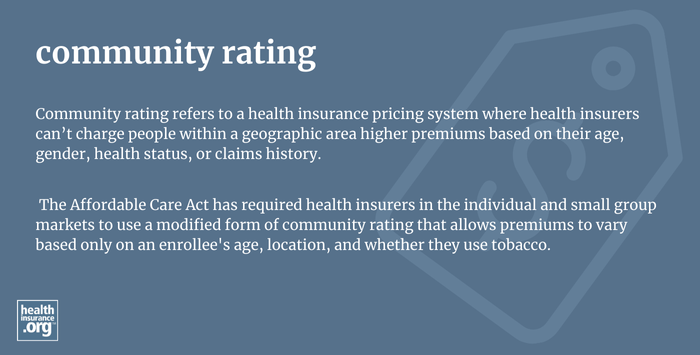
What is community rating?
Community rating refers to a health insurance pricing system where health insurers can’t charge people within a geographic area higher premiums based on their age, gender, health status, or claims history.
Since 2014, the Affordable Care Act has required health insurers in the individual and small group markets to use a modified form of community rating that allows premiums to vary mainly based on an enrollee’s age and geographic location.
ACA-compliant individual and small group plans are only allowed to charge older enrollees up to three times what younger enrollees pay (a few states limit this further1), and cannot adjust premiums based on gender or health status. Most states also allow individual and small group insurers to charge higher premiums for tobacco use.
This approach differs from pure community rating, where premiums are not allowed to vary at all based on age, gender or other demographic or health characteristics.
What is the difference between community rating and risk rating?
Prior to 2014, most health insurers used risk rating – where premiums are based on prior or expected health care costs – to determine rates in the individual and small group markets. The ACA ended that practice and replaced it with the modified form of community rating described above. As a result, premiums today are only allowed to vary based on an enrollee’s age, location, and – in most states – tobacco use.
Which health insurers currently use community rating?
All insurers offering ACA-compliant major medical plans use modified community rating in the individual and small group markets.
On the other hand, insured health plans in the large group market continue to be risk rated, meaning an insurer can base the group's premiums on the group's overall medical history. (Two important points here: Individual employees cannot be singled out for rate increases based on their medical history, and most very large employers self-insure their coverage2 rather than purchasing coverage from an insurance company).
Coverage that isn't subject to ACA regulation, such as short-term health insurance and fixed indemnity plans, does not have to abide by any community rating rules.
Medigap plans, used to supplement Original Medicare, are sometimes community-rated, and a few states require them to be.3
How does community rating affect the market for health insurance?
The use of modified community rating in the individual and small group markets means that insurers are not allowed to charge prohibitive prices to applicants who have health issues. Its use has dramatically expanded access to health insurance across the U.S.
But there is a tradeoff: Community rating has caused some healthy enrollees to pay more for health insurance than they did in the pre-ACA risk-rated individual market.
However, the vast majority of people who purchase individual health insurance in the ACA Marketplace are eligible for premium subsidies that offset some or all of their monthly premiums.4 These subsidies are a key component of making community-rated health insurance affordable.
Footnotes
- "Market Rating Reforms — State Specific Rating Variations" Centers for Medicare & Medicaid Services. Accessed Nov. 20, 2024 ⤶
- ”Employer Health Benefits, 2024 Annual Survey” KFF. Oct. 9, 2024. ⤶
- "Key Facts About Medigap Enrollment and Premiums for Medicare Beneficiaries" KFF.org. Oct. 18, 2024 ⤶
- "Effectuated Enrollment: Early 2024 Snapshot and Full Year 2023 Average" CMS.gov, July 2, 2024 ⤶


